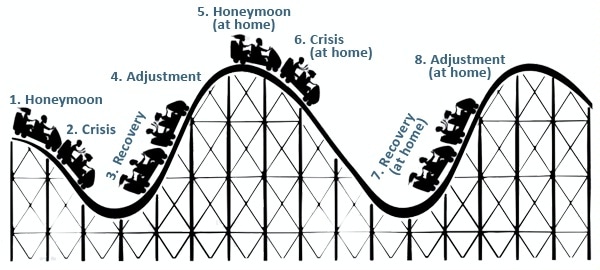
We spend so much time preparing for our overseas travels but there is one area that no one seems to talk about — the reverse culture shock and post-travel depression that nearly every traveler feels once they return home. In fact, most people are surprised that this is more difficult to deal with than the original culture shock they initially experienced while traveling.
For many travelers, returning home is the hardest part of their trip.
Reverse culture shock tends to be most severe for study abroad students and long-term travelers, but even short-term travelers experience the symptoms. Re-adjusting to life back home can be tough, and it’s very common to experience depression.
I personally struggled with re-adapting to life back home after I spent long periods of time abroad and many of my friends have too.
What is reverse culture shock and what causes it?

For many of you, your trip to Europe will be your first experience overseas, and more importantly, it will be the first time you’re truly free to do whatever you want. You’ll be exposed to a different way of looking at life, and it’s almost guaranteed that you’ll start to look at the world differently. You’ll realize that the way things are done back home isn’t always the best.
Don’t be surprised if you start to re-examine your life, priorities, values, and worldview. It’s a gradual process, and you probably won’t fully realize how you’ve changed until you return home.
Once you’re thrown back into your “normal” life back home is when the reverse culture shock hits — and for some, it will hit like a truck. You find that your old priorities, values, and worldview don’t always line up with your new views. These changes are part of the human experience, and they’re a good thing — but that doesn’t mean it’s easy. In fact, for many travelers, their time abroad triggers something like a quarter-life crisis.
You also have to make that difficult transition from vacation mode to real-world mode, which can be challenging in and of itself.
What You May Experience Once You Return Home
Many psychologists have studied reverse culture shock and post-trip depression and they’ve come up with a list of the most difficult re-entry challenges:
Boredom
Traveling is exciting because you’re constantly experiencing new things. After weeks or months of continual stimulation, being back home will understandably seem boring. This usually fades once you get back into your normal routine.
Your Friends and Family Aren’t Interested
You’ve just gone through a life-changing trip, but the people back home haven’t. You can’t (and shouldn’t) expect them to relate to your experience because your experience is personal to you. Sure, they’ll listen to your stories, but after a while they’ll tire and get bored of your tales.
I know I started catching myself beginning all my stories with “In Europe, they do it like this…” or “When I was in Europe…” and people’s eyes would start to gloss over. People just aren’t that interested. That doesn’t mean you shouldn’t ever talk about your travels, but you have to understand that not all people will care that much about your trip. Additionally, always talking about your travels can easily come off as pretentious.
Trouble Explaining Your Travels
This point is similar to the previous one. Many travelers get frustrated that they can’t convey their travels to other people — or that other people can’t understand the experiences they went through. It’s just one of those things you can’t describe. It’s like trying to describe a song to someone that’s never heard it. You’ll try but you’ll never be able to convey it.
Reverse Homesickness
If you lived/traveled overseas for an extended period of time, you’ll start to feel homesick for that location. You start comparing both locations and miss all the positive things from your previous location.
Change of Relationships
It’s very common for the relationships between you and your friends/family to change. That’s because your worldview and priorities in life have probably changed as a result of your travels. This can cause friction and misunderstandings by both parties. This can also lead to feelings of alienation because other people don’t understand you as they once did.
Feeling Out of Place in Your Own Culture
You’ve changed and you now carry a piece of your international experience with you. This can lead to a feeling that you’re a bit of an outsider in your own culture.
Home Has Changed
The world is always in a constant state of change, so many people are surprised that home has changed since they left.
The Grass Is Greener
As time passes, we tend to forget about the bad things and focus on the good things. Many people will start to over-romanticize their time abroad, and it can lead to depression.
Return To the Routine
Getting back into a routine can be difficult and depressing — especially after you’ve spent an extended amount of time with no real routine. And it’s not just about going to work. It’s the routine of everything — grocery shopping, driving, watching TV, etc. Additionally, all your old worries (student loans, jobs, money, etc.) are staring you in the face.
Getting Over Reverse Culture Shock

Most experts say the best thing is to simply give yourself time.
If you can’t seem to shake those post-trip blues, you can try some of the following things:
- Accept Change — You’re a different person, and it helps to simply accept it.
- Exercise — Getting that blood flowing is a natural anti-depressant.
- Hang Out With Friends — Find people that make you happy and don’t isolate yourself.
- Find Other Travelers — Other travelers understand what you’re going though and they’re more apt to be interested in your travel stories.
- Limit Talking About Your Time Abroad — Unless you’re asked, try to limit how much you talk about your time abroad. Talking about it too much will repel people and can make you look pretentious.
- Seek Out The Culture — If there are expats in your town, seek them out or watch movies from the country you lived in.
- Guide To Using Smartphones, SIM Cards, and Data Plans In Europe - August 2, 2025
- Backpacking Europe Packing List — My Europe Travel Packing Guide - July 26, 2025
- The Best Travel Backpacks | In-Depth Buyer’s Guide & Backpack Reviews - July 5, 2025

No Funny Business
The Savvy Backpacker is reader-supported. That means when you buy products/services through links on the site, I may earn an affiliate commission—it doesn’t cost you anything extra and it helps support the site.
Thanks For Reading! — James
Questions? Learn more about our Strict Advertising Policy and How To Support Us.





